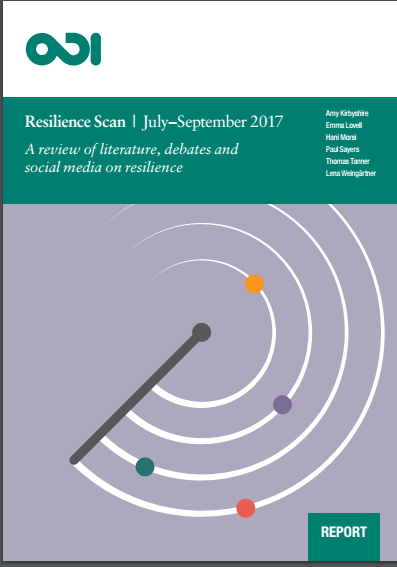Resilience Scan July – September 2017

Resilience: rising to the challenge in coastal regions Coastal areas offer unique opportunities and challenges.
The dynamics of the physical processes (from the daily tides to the ever-changing morphology) form the backdrop to some of the world’s most productive and valuable habitats and give rise to distinctive coastal economies and cultures. But they are under extreme pressure as people, infrastructure, species and habitats (saltmarshes, coral reefs and mangroves) all vie for space, space that is being squeezed as land levels subside, sea levels rise and populations grow.
The challenge of resilience is therefore in sharp focus at the coast, but as yet no blueprint exists for what constitutes coastal resilience. This is not say there has been no progress. New approaches to the management of the coast are emerging, ones that adopt a whole-system approach to managing risk and set out adaptation pathways that recognise the interdependence between human systems and coastal ecosystems in building long-term resilience. Mainstreaming these approaches is, however, diffcult, not least because of the uncertainty over long-term climate change mitigation policy (should we be planning to adapt to 1.5°C, 2°C or 5°C change in Global Mean Temperature?). Coastal adaptation will also require diffcult trade-offs to be made and greater integration of action than hitherto (across spatial and economic planning, disaster risk management (DRM) and climate adaptation agendas).
This note summarises our understanding of the impacts of climate change at the coast and explores the challenges and opportunities presented. A greater emphasis on adaptation and resilience is promoted, including the need to make space for an increasingly squeezed coast to safeguard its natural dynamic resilience (and its role in supporting conventional engineered defences). Issues of regional sediment conficts (as coastal areas are starved of sediments in response to development choices in the upstream catchment and updrift coast) and social injustice (as the vulnerable are disproportionately disadvantaged by climate change) are discussed as indicative of the multidimensional challenges at the coast and as underlining the need to mainstream whole-system, long-term thinking if we are to be successful.
